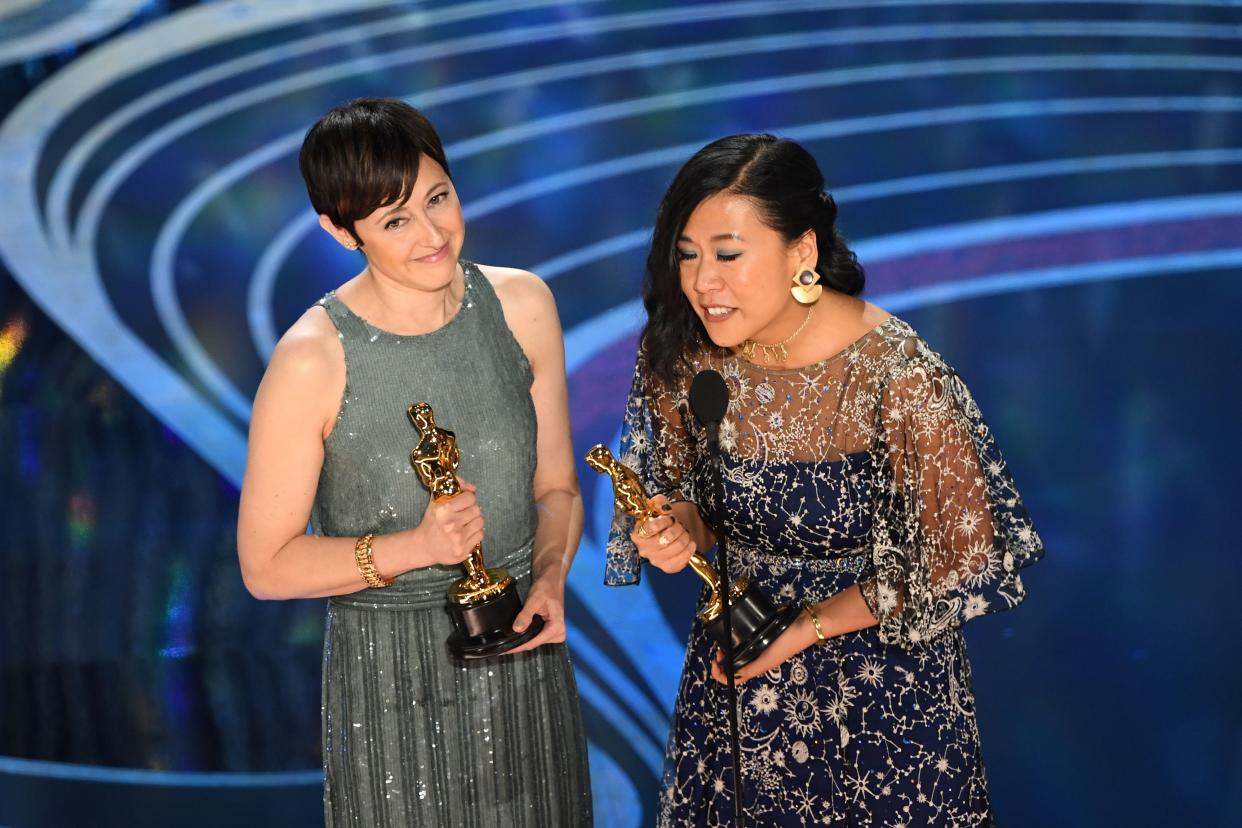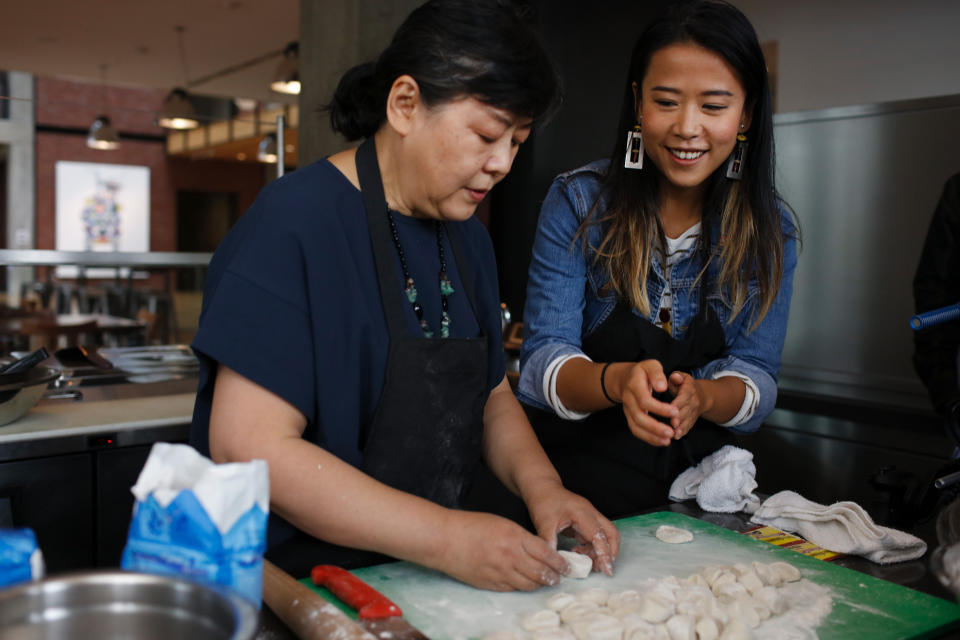Food-loving Canadian director makes history with Oscar win for Pixar's 'Bao'

From Inside Out, Incredibles 2 and the upcoming Toy Story 4, Toronto-raised Domee Shi has touched some of the most popular animated films, released by the world’s biggest animator. Now Shi has solidified her place in history with her Oscar-winning movie Bao.
“To all of the nerdy girls out there who hide behind their sketch books, don’t be afraid to tell your stories to the world,” Shi said in her acceptance speech at the 91st Academy Awards.
"To all of the nerdy girls out there who hide behind their sketchbooks—don't be afraid to tell your stories to the world!"
The makers of "Bao" give an impassioned speech accepting the award for Best Short Animated Film: https://t.co/zSrvQG8ZE6 pic.twitter.com/NkAQnlEm1K
— ABC News (@ABC) February 25, 2019
Not only has the Canadian gained international attention for her coveted 2019 Oscar, she is also the first female director to lead a Pixar short film.
“I feel so honored and so humbled to be the first but also, I hope that I’m the first of many and it is an ongoing trend,” Shi told Yahoo News Canada. “I’m usually a very shy person, I’m kind of introverted and I don’t like my picture taken but in this case, yes, show me around so that I can bring hope to other nerdy girls like me.”
Shi graduated from Sheridan College’s animation program in 2011 and was selected for the Pixar internship program. She’s stayed with the company, leading to her directorial debut with Pixar and the high-profile Oscar win. Shi’s parents, who still live in Toronto, were the first people to congratulate her when she received the nomination.
“My parents were the first people to text me in the morning and my dad, he was so over the moon that he just started texting me in Chinese, and I can’t read Chinese,” Shi said. “They’re just so excited and proud, and they can now say that their daughter is an Oscar nominated short film director, and I’m sure they’ve been saying that to all their friends.”
As a story artist, Shi always thought she would remain behind her drawings, relatively unidentifiable, but this latest recognition has pushed her to the forefront of the entertainment industry. When Shi walked the coveted Academy Awards red carpet, it was at a time when diversity in Hollywood has been a hot topic of discussion. With campaigns like Times’s Up and #OscarsSoWhite demanding more women and people of colour in key roles, Shi hopes that more unique, creative stories can be told and recognized in the entertainment industry.
“We have to look at different sources of creativity and not just draw from the same well over and over again. I’m just really happy that the Academy and that the industry in general is hopefully realizing that,” Shi said. “You just get a more unique, more universally resonant product out of it, it just seems logical to me.”
Creating Bao
Drawing from her childhood in a Chinese family growing up in Toronto, Shi decided to share her personal life experience with the world in Bao. It tells the story of a Chinese mother, going through empty nest syndrome, who gets a second chance at motherhood when a little dumpling comes to life.
“I just had this idea of this Chinese mom coddling this little baby dumpling boy to death,” Shi said. “That was the image that popped into my head one night in the office and from that image, I kind of built this story.”
Shi came up with the idea over four years ago, while she was working at Pixar as a story artist on the film Inside Out. When she was a student, Shi loved making short films at school and wanted to start working on a short of her own. Shi herself grew up as an only child to “overprotective” Chinese parents. She wanted to explore the relationship between the parents and the child, but from the parents’ point of view.
“I wanted to understand why my mom smothered me so much growing up and I was always that super frustrated, coddled little dumpling,” Shi said.

The mother in the story is very much inspired by Shi’s own mother. The hands of the animated character and the intricacies of the dumpling-making technique are all inspired by Shi’s mother, who even flew out to California to teach dumpling making to the Pixar team.
“They always say write what you know, so I based it in Toronto, kind of around the same area that I grew up in, and I also wanted to celebrate the food I grew up with,” Shi said.

Toronto connection
Any Torontonian that watches the film will quickly spot quintessentially Toronto landmarks in Bao, including the city’s streetcars. But Shi didn’t know at the outset that she was going to place the film in her hometown. When her art team asked for references to bring this animated world to life, Shi knew a real-world example would be the most helpful.
“I don’t see Toronto really depicted a lot in movies and if I do, it’s always disguised as another city, and I just wanted to pay homage to my hometown,” Shi said. “I also think it just gives the short a more unique vibe, that it’s a Chinese immigrant story but it takes place in Canada, so it gets even more specific.”
Even though Shi has made the move to California, there are plenty of things she misses about Toronto, primarily the food.
“That’s one of the things that I realized when I moved out to California was that you can’t buy a Jamaican beef patty at every corner anymore or eat a roti,” Shi said. “I feel like the Chinese food in Toronto is amazing too…so many restaurants that just pop up like every month in Toronto that serve really authentic, region specific Chinese food.”
But as her career continues to push forward, including working on a new feature film with Pixar, Shi’s unique perspective to stories and storytelling is still at the core of what she creates.
“People have been coming up [to me] saying they appreciate seeing their families and their childhood and their world on the big screen,” Shi said. “I think that it didn’t really hit me until I started speaking to audience members about it but I think that’s really important to people, so they can see themselves on screen.”


